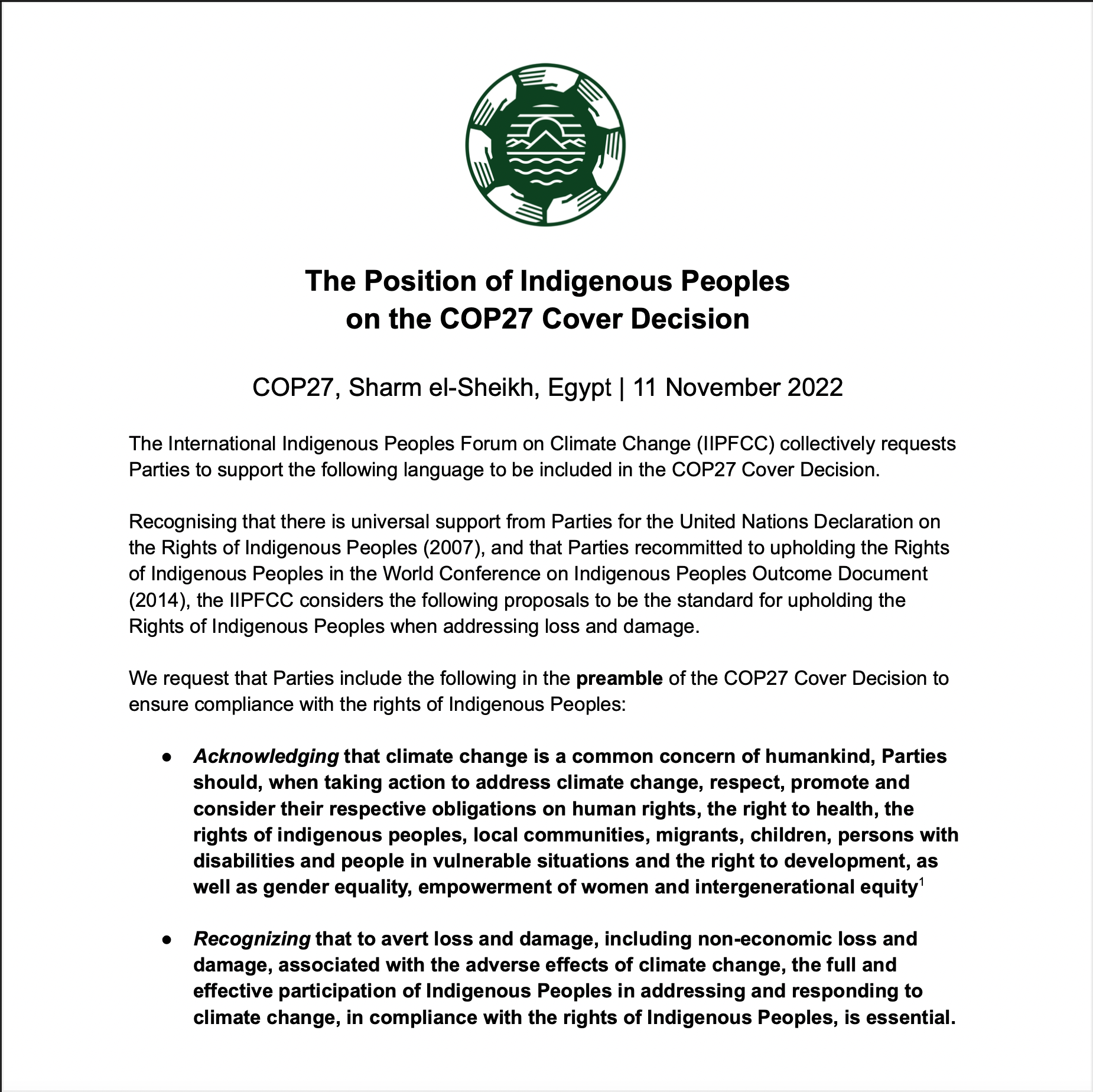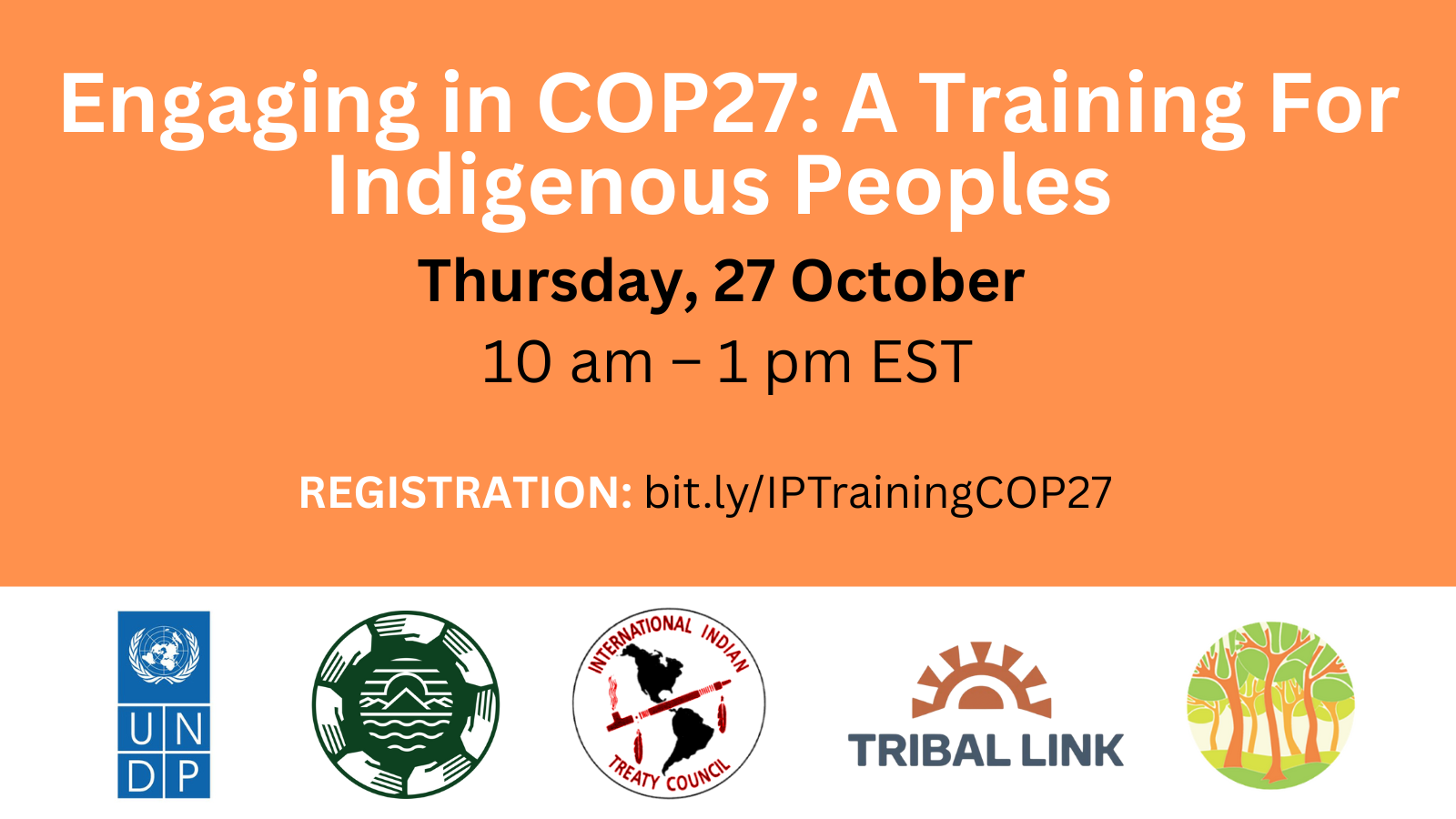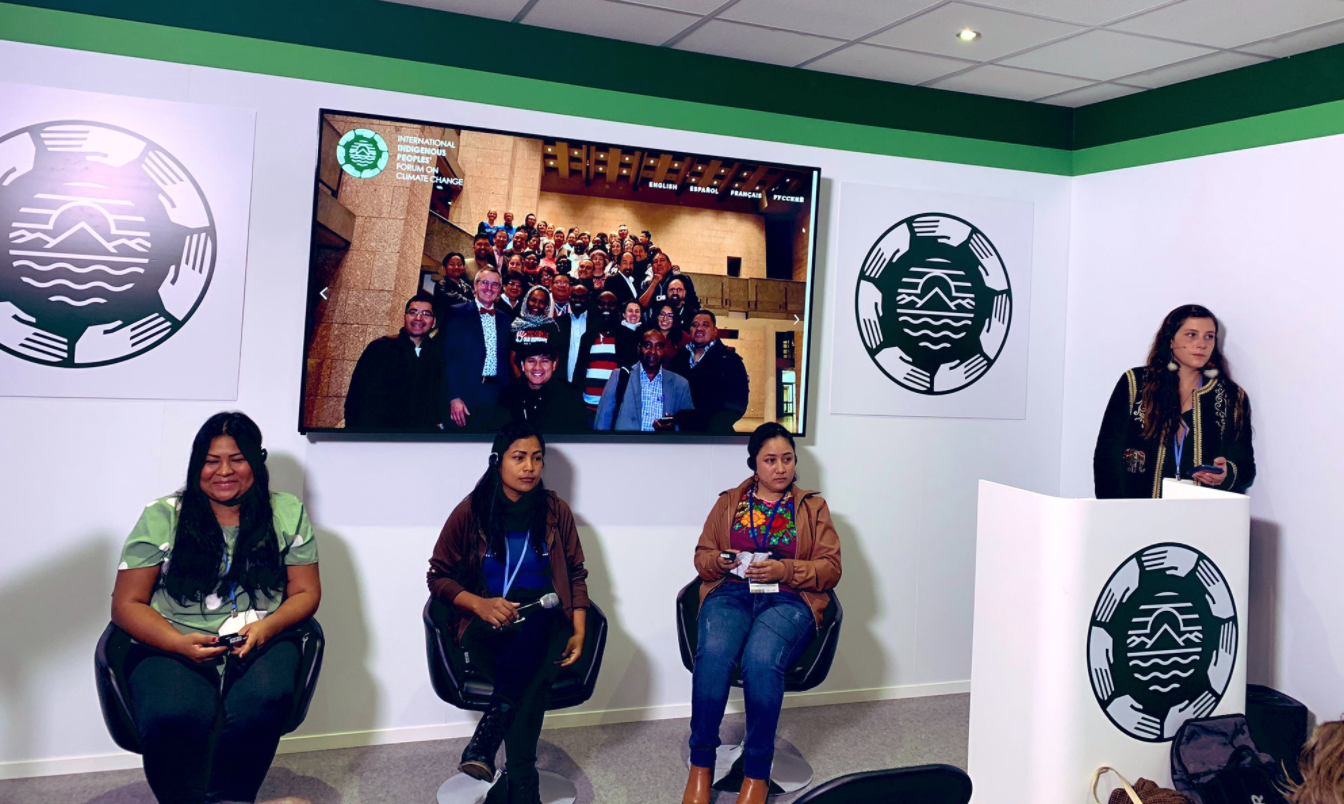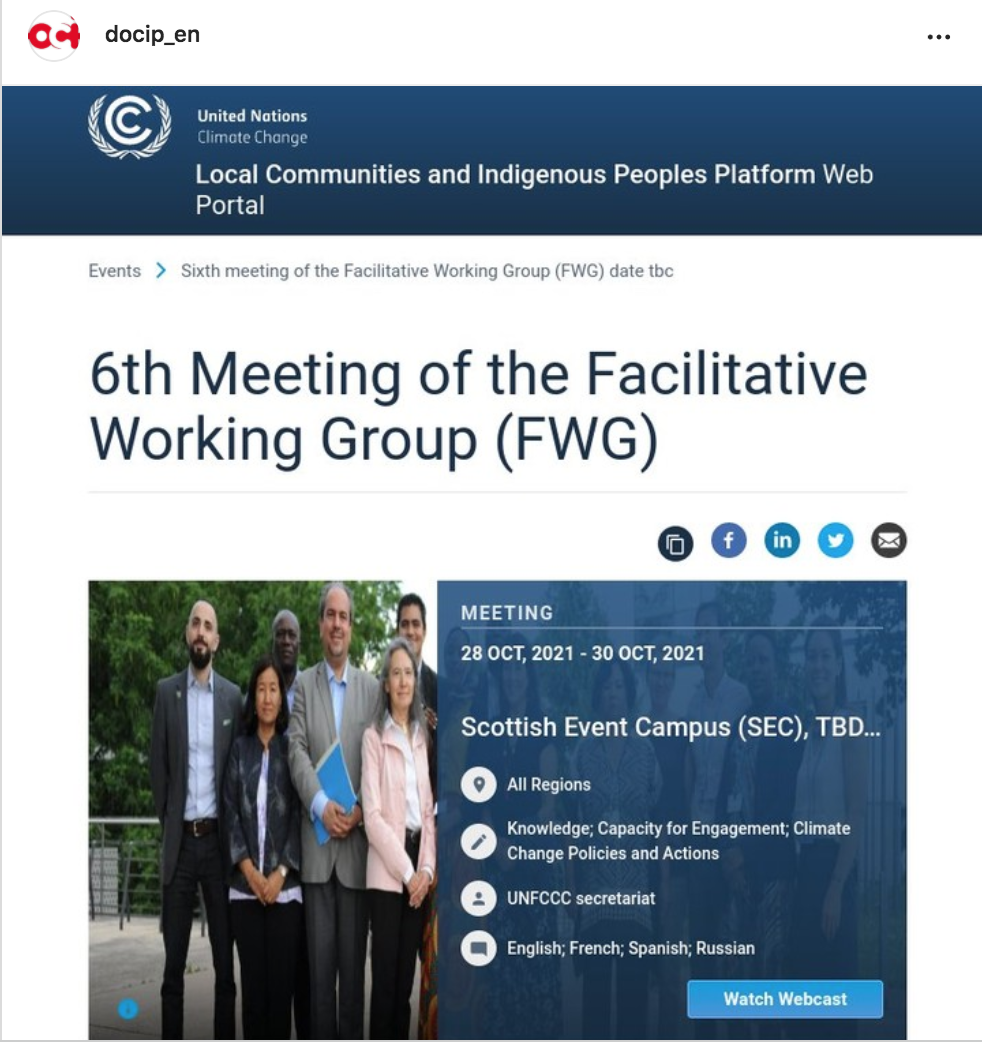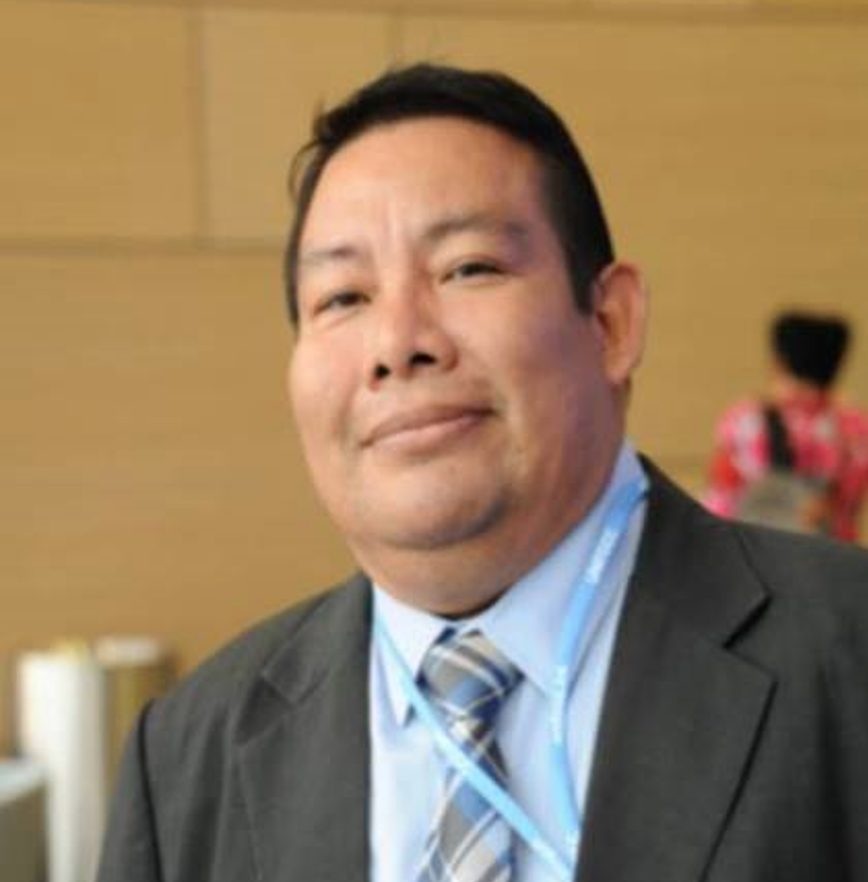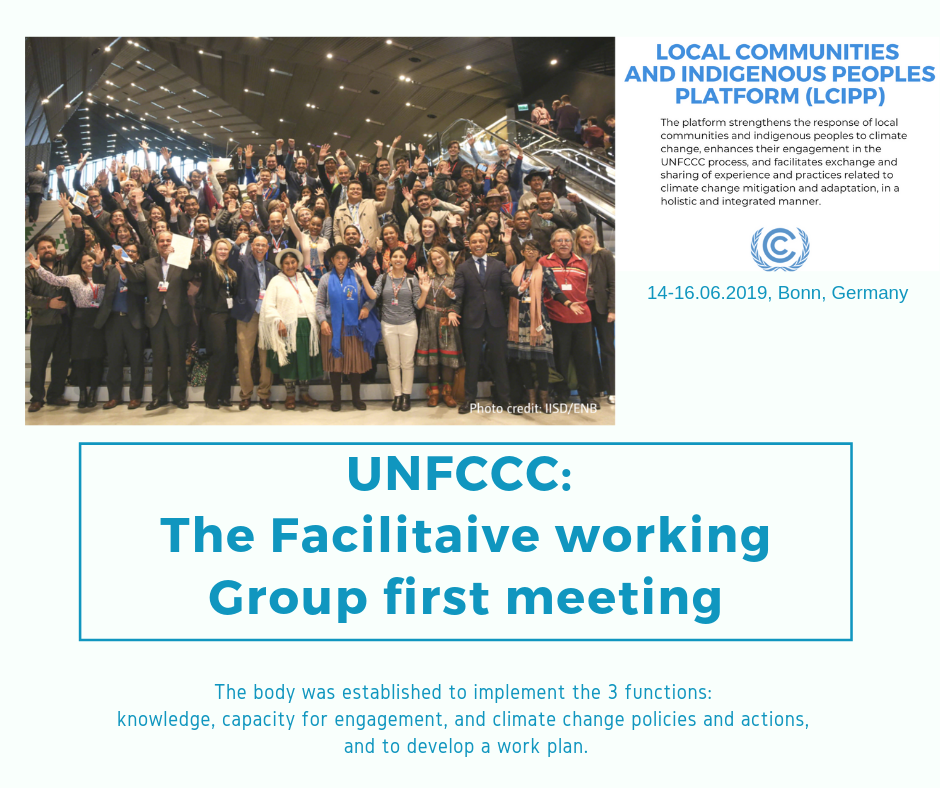COP28 Indigenous Peoples Dialogue with the UN Climate Change High-Level Champions, the COP 28 Presidency, and the UNFCCC Secretariat
In line with the celebration of the Indigenous Peoples Day at COP28 the @iipfcc participated in the COP28 Indigenous Peoples Dialogue with the UN Climate Change High-Level Champions, the COP 28 Presidency, and the UNFCCC Secretariat on 5 December in the Blue Zone at the Expo City Dubai.
Indigenous Peoples are key agents of change for climate action and for ensuring a just transition for all. Growing evidence shows that Indigenous Peoples values, knowledge, practices, and ways of living are instrumental for environmental conservation, maintaining biodiversity, furthering green jobs, enhancing resilience, and addressing climate change.
The Dialogue focused on how collective action can support both Indigenous Peoples inclusion in just transition plans and highlight clear examples of how Indigenous Peoples are already leading and contributing to just and inclusive transitions.
@indigenousclimateaction @ndncollective @iiyf.climatechange @treaty_council @emairena @hindououmar
Indigenous Peoples Pavilion and Launch of Call-for-Sessions
Good morning relatives,
We are pleased to announce that the Indigenous Peoples Pavilion at COP 28 in Dubai has been confirmed! We have been allocated 180 m2 in the Blue Zone in a pre-existing building. The building will also have a separate office. We have formed a committee with representatives from all regions that will be responsible for the selection of proposals and the design.
Thanks to this group, we are excited to launch the Call for Sessions for the Indigenous Peoples Pavilion. We invite Indigenous Peoples, Indigenous organisations, support organisations, and Parties to submit events – such as presentations, policy dialogues, roundtables and publication launches – and artistic demonstrations – such as images and videos – by 18 September 2022. Please note that those wishing to present a session in person need UNFCCC accreditation ('a badge').
For more information, please see the call for sessions here
If you have any questions, please contact Rosario Carmona (rosariocarmonayost@gmail.com).
The position of Indigenous Peoples in relation to the Cover Decision of COP27
The position of Indigenous Peoples in relation to the Cover Decision of COP27, which is in the hands of the COP Presidency.
Calling Egypt to:
- Build upon the progress made
- Refer to the eleventh preambular paragraph of the Paris Agreement
- Include a new preambular paragraph drafted by Indigenous Peoples
Statement of the IIPFCC at the Joint Opening Plenary at COP27
Statement of the International Indigenous Peoples Forum on Climate Change (IIPFCC),
Joint Opening Plenary at COP27, Sharm El Sheikh, Egypt November 6, 2022
The IIPFCC statement was delivered by youth representative, Mr. Nourene Ahmat Yaya
Climate change is a matter of life and death. State actions have fallen far short, Greenhouse gas emissions and global temperatures are increasing, threatening genocide for Indigenous Peoples in Africa, the Arctic, Coastal, Small Island and all other ecosystems.
Indigenous Peoples’ rights are inherent, collective and internationally recognized, including rights to life, self-determination, lands and territories, food systems, and free prior and informed consent. We will not allow these rights to be diminished by conflating us with minorities, vulnerable groups or local communities.
We have the right to full and direct participation, including our youth, women, persons with disabilities and knowledge holders, in all UNFCCC bodies and processes including the new Article 6 grievance mechanism and the creation of a new financing mechanism accessible to Indigenous Peoples from all regions and eco-systems.
Carbon markets and offsets, geo-engineering, “Net Zero” frameworks, “Nature-based solutions”, “ecosystem services” do not cut emissions and are new forms of colonization.
The NDC’s must include clear indicators for drastic reduction of greenhouse gas emissions, including the accelerated phase out of fossil fuels in order to maintain the 1.5-degree Paris commitment. The Paris Agreement also commits States to respect, promote and consider their obligations to the rights of Indigenous Peoples in climate action. The Global Stock Take must focus on implementation of these commitments.
We commit to real solutions based on our knowledge, practices and time-tested sciences, and the full exercise of our rights, at the United Nations and in our own territories. We will continue to work with you for the survival of our children, and yours.
Thank you.
Note: This statement presented yesterday (in Arabic) by an Indigenous representative from the African Region last night in the plenary at formal opening of the COP 27 in Sharm el-Sheikh Egypt. The statement was limited to 2 minutes and a longer version was submitted to post. The IIPFCC statement was adopted after several hours of discussion by the entire Indigenous Peoples Caucus during preparatory meeting this past weekend. More than 200 IPs representatives from all regions are present.
8th Meeting of the Facilitative Working Group (FWG)
The 8th Meeting of the Facilitative Working Group (FWG 7) will take place from 1-4 November 2022 at Zone D Meeting Room 5 of COP 27 venue in Sharm El-Sheikh, Egypt. See the agenda for more details: Click here.
For further information contact the LCIPP team via lcipp@unfccc.int
ENGAGING IN COP27: A TRAINING FOR INDIGENOUS PEOPLES
ENGAGING in COP27: A Training For Indigenous Peoples
Thursday, 27 October
10am – 1pm EST
The following presentations will take place, with an opportunity for questions
and discussion on each topic:
History of Indigenous Peoples’ Engagement and Opportunities to Engage
in the UNFCCC: Andrea Carmen, Executive Director, International Indian
Treaty Council and former Co-Chair, Facilitative Working Group of the Local
Community and Indigenous Peoples PlatformEntry Points into UNFCCC Negotiations and Agenda for COP27: Graeme
Reed, Co-chair, International Indigenous Peoples Forum on Climate Change;
Climate Adviser, Assembly of First Nations, CanadaNationally Determined Contributions (NDCs) and COP27 101: Sameera
Savarala, Programme Specialist, NDCs and Negotiations, UNDP Climate
PromiseClosing remarks: Rochelle Diver, International Indian Treaty Council
Simultaneous interpretation available in Spanish, French, Portuguese
REGISTER HERE
IIPFCC / FIPICC Pavilion: Call for Proposals at COP 27 / Convocatoria de Propuestas para la COP 27 / Call for proposals for COP 27
*Español más abajo / En français ci-dessous
The International Indigenous Peoples Forum on Climate Change (IIPFCC) is now accepting proposals for events and exhibits to be held at the Indigenous Peoples' Pavilion during COP27 in Sharm el-Sheikh, Egypt. The Pavilion, located in the Blue Zone, will facilitate the effective representation of Indigenous Peoples by communicating and amplifying their messages during the COP27 negotiations. It will also serve as a learning and knowledge exchange center on Indigenous Peoples' issues in the climate context, showcasing solutions based on Indigenous knowledge. To this end, it will convene online and hybrid events such as presentations, policy dialogues and panel discussions.
This Open Call for Proposals invites Indigenous Peoples, Indigenous organizations, supportive organizations, and Parties to submit the events they would like to host at the Pavilion by September 12, 2022. For those interested, please fill complete the Call-for-Sessions (https://forms.gle/hAmaNuXmLw6JMGaEA). For questions, please reach out to Rosario Carmona (rosariocarmonayost@gmail.com).
===============
El Foro Internacional de Pueblos Indígenas sur Cambio Climático está aceptando propuestas de events y exposiciones a realizarse en el Pabellón de los Pueblos Indígenas during COP27 in Sharm el-Sheikh, Egypt. El Pabellón will be planned and programmed by a team of indigenous representatives from the FIPICC region: Africa, el Ártico, Asia, América Latina y el Caribe, América del Norte, el Pacífico y Rusia y Europa del Este.
El Pabellón, located in the Zona Azul, will be a platform visible to communicate and amplify the messages of the indigenous pueblos during the COP27 negotiations. Its purpose is to facilitate the effective representation of the indigenous pueblos, providing a meeting space dedicated to coordinating the communication and promotion strata, as well as also amplifying the solutions of the indigenous pueblos before the climatic climate basadas en el conocimiento indígena. También will serve as a center of learning and interaction of conocimientos on the problems of the indigenous pueblos in the climatic context. Para ello, convocará events como presentationaciones, diálogos políticos, mesas redondas, lanzamientos de publicaciones, etc. Estos events serán tanto presenciales como hybridos,
Al igual que en años anteriores, el Pabellón de los Pueblos Indígenas will attract high level attention, with ministers of Estado, ministers and other functionaries and political leaders, medios de comunicación mundiales y miembros del public in general que visitarán el espacio y participarán en su programa.
Esta convocatoria para propuestas invita a los pueblos indigenas, las organizaciones indígenas, las organizaciones solidarias y las Partis a presentar propuestas de events antes del 16 de septiembre de 2022. the UNFCCC ("una credential").
If you preguntas, póngase in contacto con rosariocarmonayost@gmail.com
==================================
Le Forum international des peuples autochtones sur le changement climatique (FIPACC) accepte désormais les propositions d'événements et d'expositions qui se tiendront au Pavillon des peuples autochtones pendant la COP27 à Sharm el-Sheikh, en Égypte. Le Pavillon, situé dans la Zone Bleue, facilitera la représentation effective des Peuples Autochtones en communiquant et amplifiant leurs messages pendant les négociations de la COP27. Il servira également de centre d'apprentissage et d'échange de connaissances sur les questions relatives aux peuples autochtones dans le contexte climatique, en présentant des solutions fondées sur le savoir autochtone. À cette fin, il organisera des événements en ligne et hybrides, tels que des présentations, des dialogues politiques et des tables rondes.
Cet appel à propositions ouvert invite les peuples autochtones, les organisations autochtones, les organisations de soutien et les parties à soumettre les événements qu'ils souhaitent organiser au Pavillon avant le 12 septembre 2022. Les personnes intéressées sont invitées à remplir l'appel à propositions (https://forms.gle/hAmaNuXmLw6JMGaEA). Pour toute question, veuillez contacter Rosario Carmona (rosariocarmonayost@gmail.com).
PRESS RELEASE: Indigenous Peoples' Caucus Opening Statement
[español sigue]
November 3, 2021
Indigenous Peoples’ Caucus Opening Statement for COP26
Glasgow, Scotland - November 3
HIGH LEVEL OPENING
31 October 2021
READ BY: Taily Terena, Terena Indigenous People
Indigenous Peoples are affected first and worst by climate change and colonial climate action, yet we drive critical climate solutions rooted in our relationships with the living world.
In exercising our protection on the frontlines, we face criminalisation, human rights violations, and assassination. And in the COPs, we are excluded from decision making on issues that affect us the most. The COVID-19 pandemic has only exacerbated this injustice.
We call for a rapid reduction in emissions that drives a just transition away from fossil fuels and ensures a 1.5 degree future.
We are deeply concerned by so-called Nature-based Solutions developed without our input and free, prior, and informed consent - undermining our self-determination and secure land tenure.
Our expectations for this COP are that:
Article 6 upholds human rights, and specifically, Indigenous Peoples’ Rights, and leads to real emissions reductions.
Indigenous food sovereignty is centered in all agricultural discussions, and particularly the Koroniva dialogue.
Equitable and long-term climate financing directly to Indigenous Peoples’ Organizations across all seven regions.
A permanent SB agenda item is established on Loss and Damage. Any outcome must safeguard Indigenous Peoples’ Rights and address non-economic losses to our communities.
The draft three-year Work plan of the LCIPP is adopted and implemented, including recommendations of the FWG Report.
The Gender Action Plan is advanced, and upholds land rights, including those of Indigenous women.
Persons with Disability are meaningfully included in UNFCCC processes as a formal constituency.
COP26 and future COPs must ensure the participation of Indigenous Peoples, including those of us with multiple intersections of identity.
Colonialism caused climate change.
Our Rights and Traditional Knowledge are the solution.
Thank you, Chair.
Taily Terena presenting the opening statement of the Indigenous Peoples Caucus at COP26.
Contact: Kera Sherwood-O'Regan
Email: kera@sustainedability.com
Phone: +64 210 410 932
PARA PUBLICACIÓN INMEDIATA
3 de noviembre de 2021
Declaración de apertura del Cónclave de los Pueblos Indígenas para la COP26
Glasgow, Escocia - 3 de noviembre
APERTURA DE ALTO NIVEL
31 de octubre de 2021
LEÍDO POR: Taily Terena, Pueblo Indígena Terena
Los Pueblos Indígenas son los primeros y peores afectados por el cambio climático y la acción climática colonial, sin embargo, impulsamos soluciones climáticas críticas enraizadas en nuestras relaciones con el mundo vivo.
Al ejercer nuestra protección en primera línea, nos enfrentamos a la criminalización, las violaciones de los derechos humanos y el asesinato. Y en las COP, se nos excluye de la toma de decisiones sobre las cuestiones que más nos afectan. La pandemia del COVID-19 no ha hecho más que agravar esta injusticia.
Pedimos una rápida reducción de las emisiones que impulse una transición justa para abandonar los combustibles fósiles y garantice un futuro de 1,5 grados.
Estamos profundamente preocupados por las llamadas soluciones basadas en la naturaleza desarrolladas sin nuestra aportación y consentimiento libre, previo e informado, lo que socava nuestra autodeterminación y la seguridad de la tenencia de la tierra.
Nuestras expectativas para esta COP son que:
El artículo 6 defienda los derechos humanos, y específicamente los derechos de los pueblos indígenas, y conduzca a una reducción real de las emisiones.
La soberanía alimentaria indígena se centre en todas las discusiones agrícolas, y en particular en el diálogo de Koroniva.
Financiación climática equitativa y a largo plazo directamente a las Organizaciones de Pueblos Indígenas en las siete regiones.
Se establece un punto permanente en la agenda del SB sobre Pérdidas y Daños. Cualquier resultado debe salvaguardar los derechos de los pueblos indígenas y abordar las pérdidas no económicas de nuestras comunidades.
Se adopta e implementa el proyecto de plan de trabajo trienal de la LCIPP, incluyendo las recomendaciones del informe del FWG.
El Plan de Acción de Género avanza y defiende los derechos a la tierra, incluidos los de las mujeres indígenas.
Las personas con discapacidad se incluyen de manera significativa en los procesos de la CMNUCC como un grupo formal.
La COP26 y las futuras COP deben garantizar la participación de los Pueblos Indígenas, incluidos los que tenemos múltiples intersecciones de identidad.
El colonialismo causó el cambio climático.
Nuestros derechos y conocimientos tradicionales son la solución.
Gracias, Presidente.
Traducción realizada con la versión gratuita del traductor www.DeepL.com/Translator
Taily Terena presentando la declaración de apertura del Caucus de Pueblos Indígenas en la COP26.
Contacto: Kera Sherwood-O'Regan
Correo electrónico: kera@sustainedability.com
Teléfono: +64 210 410 932
Live stream from the Indigenous Peoples Pavilion Available
The Indigenous Peoples Pavilion is located in the Blue Zone of the COP26 Glasgow campus. To attend in person, you must have UNFCCC accreditation to the Blue Zone. Events at the Indigenous Peoples Pavilion will take place in Events Hall D. There is level entry to the Pavilion from the main floor. Inside the pavilion, seating is available and is spaced to maintain physical distancing for COVID-19 safety.
Most Pavilion events for the duration of COP26 will be live-streamed to facilitate participation from around the world.
Please check event details ahead of time to ensure your session will be live-streamed and to view interpretation options. We encourage registering and joining events via Zoom where possible to access interpretation and audience engagement functions.
You can watch the live broadcast, click here.
Pavilions operation hours: Monday, 1 November to Friday, 12 November: 08:00 – 22:00 hrs
Facilitative Working Group on the Local Communities and Indigenous Peoples
Don't miss the last day of the 6th meeting of the Facilitative Working Group on the Local Communities and Indigenous Peoples Platform tomorrow!
✅ Date: Saturday, October 30, 2021
✅ Time: 8:00 AM - 2:30 PM UTC
✅ Live transmission: https://bit.ly/3pHO6yo
✅ More information: https://bit.ly/3Ckiken
✅ Languages: English, Spanish, French, Russian
Information to participants of the sixth meeting of the facilitative working group from 28 to 30 October 2021
In preparation for the event that will take place in Glasgow, we would like to provide you with the following general information:
Date and venue: From 28 to 30 October at the Side Event room 1, Room Loch Lomond _ located at the Armadillo – Clyde Auditorium.
FWG6 webpage: You will find the agenda with related documents and additional information for the meeting.
Interpretation: French, Spanish and Russian will be provided.
Connectivity for virtual participation, guidelines below:
Access to this meeting is restricted to invited users. Participants to receive an invitation soon.
All delegates interested in joining remotely MUST have completed the Virtual ID check OR have acquired a COP26 badge at the venue in Glasgow. To find and join their meetings they will need to login to the COP26 platform https://cop26platform.unfccc.int.
The meeting will be published in the COP26 platform schedule. Delegates who are invited will be able to Join the meeting directly from this schedule.
Delegates will be able to request the floor and once given the floor they can unmute and address the meeting. We encourage participants to review the provided training material before joining the meeting. Training materials can be found on the COP26 platform.
Badging for in-person participation: You need to collect your FWG6 badge at the registration counter first thing before you are allowed to access the venue.
Below is also some important information regarding your travels and entry to the United Kingdom. Additionally, attached is document produced by the UK COP Presidency that outlines guidance on how to plan your journey to UNFCCC COP26 for those who are joining physically in-person.
Covid-19 testing pre and post arrival:
Pre departure: All participants at COP26 must be able to provide evidence of a negative Covid-19 test taken in the 72 hours before departing to the UK. You may be asked to show this before boarding the service departing to the UK.
Passenger locator form:
All arrivals to the UK, including those attending COP26 must complete a passenger locator form up to 48 hours before they arrive in the UK. You can find the passenger locator form via this link here.
The passing of our dear colleague Estebancio Castro-Diaz
Para la versión en español: Haga clic aquí
Estebancio Castro-Diaz, Kuna
On behalf of the International Indigenous Peoples Forum on Climate Change (IIPFCC), it is with great sadness that we acknowledge the passing of our dear friend, brother, colleague, and mentor Estebancio Castro-Diaz.
Estebancio is a Kuna leader who has been involved in the international movement for climate justice and rights of Indigenous Peoples for decades. He played an essential role as Focal Point of the Indigenous Peoples Constituency (the Caucus) as well as a member of the Facilitative Working Group of the Local Communities and Indigenous Peoples Platform (‘The Platform’), representing the Latin America and the Caribbean UN Indigenous socio-cultural region. Put simply, indigenous participation within the UN Framework Convention on Climate Change (UNFCCC) would not be as successful without Estebancio having participated for so long. This has been recognized by the Executive Secretary, the Chair of the SBSTA, and all Constituency groups.
This legacy is difficult to meaningfully articulate in words. Over the last week, hundreds of stories and memories of Estebancio have been shared over email and video calls. Many remember him as an exceptionally skilled diplomat who not only took his responsibilities to advocate for Indigenous Peoples around the globe to heart, but also developed a unique style that included humility, dedication, and laughter. He was steadfast in his commitment to protecting Mother Earth, highlighted by his dedication into the late hours of the night and the final hours of these large conferences. But no matter the seriousness of the situation, he is remembered to have always brought good humour, a cheeky smile, and deep empathy.
Many old and new members of the IIPFCC, and the broader international Indigenous movement, credit Estebancio’s generous teaching with the skills, knowledge, and diplomacy required to continue the legacy of making space for Indigenous Peoples and Nations in state-led processes. He was welcoming to all Indigenous Peoples entering the space, but took extra care in supporting the participation of Indigenous Youth - many who credit their understanding of these complex processes to him and his willingness to answer questions, listen, and direct with a gentle hand.
A core part of this work for Indigenous Peoples is being a good ancestor to those future generations. As Estebancio makes his journey to being an ancestor, we honour, from all seven regions, his extensive legacy for Indigenous Peoples worldwide. We are privileged to carry his spirit with us always.
We send our love and care to Estebancio’s family and Kuna Yala in this time of grief and loss.
Rest in power, dear brother Estebancio.
The Last Goodbye
Receiving news of a brothers passing
Feeling them in the morning light
next to a fresh fire
Snowflakes, perfect stars shining down on me.
Feeding the fire
Saying thank you brother - for all the laughter you gave.
For all that you shared, for your spirit and endurance.
For all those years you paved a way for us to continue on.
The fire running through the day.
Oh, how you will be missed!
By Jannie Staffansson
Indigenous Peoples Preparatory Caucus Meeting - Nov 30 (1-5pm) and Dec 1 (9-6:30pm) at the HOTEL MADRID CHAMARTIN
[español sigue]
Aanii Indigenous relatives,
Please find attached the draft Agenda for the upcoming Preparatory Caucus Meeting on November 30 (1-5pm) and Dec 1 (9-6:30pm). All Indigenous Peoples and their organizations are invited to attend. The meeting will be held at the Hotel Madrid Chamartin (Calle Mauricio Ravel, 10, 28046 Madrid, Spain). The direction from IFEMA to the hotel are attached.
We also remind everyone that the Call for Sessions for the Indigenous Pavilion is still open at this link: https://docs.google.com/forms/d/e/1FAIpQLScaxda6DnLz4XXByN6g7xXgn3bvRWZVW4PiQleQfcclaBEHjw/viewform?fbclid=IwAR3CncmczLlkdDkKI0MrKqBsPUjTwRmK32aYMuCiuzA_GMaK5_Ie_6rlrBU. Please submit your proposals by latest November 27. In preparation for this space, if there is any decoration or flags that you would like to bring to decorate the space, please do so.
________________________________________________________________________
Favor de encontrar adjunta la Agenda para la próxima Junta de la Asamblea Preparatoria en Noviembre 30 (1-5pm) y Diciembre 1 (9-6:30pm) Todas los Pueblos Indígenas y sus organizaciones son invitados a asistir. La junta tendrá lugar en el Hotel Madrid Chamartin (Calle Mauricio Ravel, 10, 28046 Madrid, Spain). La dirección del IFEMA al hotel donde la junta tendra lugar esta adjunta.
También les recordamos que la Convocatoria para Sesiones en el Pabellón Indígena siguen abiertas aqui: https://docs.google.com/forms/d/e/1FAIpQLScaxda6DnLz4XXByN6g7xXgn3bvRWZVW4PiQleQfcclaBEHjw/viewform?fbclid=IwAR3CncmczLlkdDkKI0MrKqBsPUjTwRmK32aYMuCiuzA_GMaK5_Ie_6rlrBU
Favor de mandar sus propuestas a mas tardar Noviembre 27. En preparación para este espacio, si tienen algunas decoraciones o banderas que quisieran contribuir para decorar el espacio, por favor no duden en traerlo.
……………………………
With warm regards,
IIPFCC Co-Chairs and Focal Points
Documents / Documentos
IFEMA to TRYP Madrid Chamartin
FAO Expert Seminar on Traditional Knowledge and Indigenous Peoples Fisheries in the Arctic Region
FAO Expert Seminar on Traditional Knowledge and Indigenous Peoples Fisheries in the Arctic Region
September 23 - 35, 2019, Rome, Italy
Draft agenda: http://bit.ly/2kVnta0
Webcast: http://bit.ly/2m7ay4Y
Draft 3yr Workplan of the Facilitative Working Group of the Local Communities and Indigenous Peoples Platform...
Purposes of the Local Communities and Indigenous Peoples Platform “To strengthen the knowledge, technologies, practices and efforts of local communities and indigenous peoples related to addressing and responding to climate change, to facilitate the exchange of experience and the sharing of best practices and lessons learned related to mitigation and adaptation in a holistic and integrated manner and to enhance the engagement of local communities and indigenous peoples in the UNFCCC process”
Context and background
The Facilitative Working Group (FWG) of the Local Communities and Indigenous Peoples Platform (LCIPP) presents the draft two-year work plan of the Platform. The FWG developed this workplan in accordance with the Paris Agreement, in decision 1/CP.21, to take collective action “to mobilize stronger and more ambitious climate action by all,” including Indigenous peoples and local communities. The Facilitative Working Group recognizes the significance of the decision made by the Conference of the Parties at its twenty-first session to establish “a platform for the exchange of experiences and sharing of best practices on mitigation and adaptation in a holistic and integrated manner” for indigenous peoples, local communities and Parties. It also noted decision 2/CP.23 and decision 2/CP.24 in its development of the proposed workplan.
See full FWG workplan as of :25 June 2019 here: https://www.iitc.org/wp-content/uploads/FWG-1-workplan-v25June-v1805hrs-CLEAN.pdf?fbclid=IwAR02eUznUtAIf0kSSI1a-T_biVWfq21GCJsmeJ73DzyUX4-KJz65ZtHA7Wo
First Meeting of the FWG of the LCIPP in Bonn, Germany, 14-16 June 2019
This weekend is the First meeting of the Facilitative Working group of the Local Communities and Indigenous Peoples´ Platform (LCIPP) under the UNFCCC. The Platform was created to operationalize and facilitate the implementation of the Platforms 3 functions related to knowledge, capacity for engagement, and climate change policies and actions.
Courtesy of The Saami Council
Indigenous Peoples, Climate Change, Traditional Knowledge and the new UN BBNJ Treaty
The high seas hold some of the greatest reservoirs of biodiversity, covering two-thirds of the world’s oceans
Only 1% is protected.
Indigenous Peoples and our Traditional Knowledge can be instrumental in addressing climate change, and protecting biodiversity in the high seas for generations to come. That's why our voices are essential in the new United Nations BBNJ Treaty 🌏
👉🏽 Join our Talanoa this Monday and find out how.
Speakers include; Salaseini Tagicakibau; Roberto Mukaro Borrero; Tina Ngata The Non-Plastic Māori; Ghazali Ohorella; and Clement Yow Mulalap. Participants are encouraged to also share their thoughts and ideas in the talanoa.
SIDE EVENT DETAILS:
"Indigenous Peoples, Climate Change, Traditional Knowledge and the new UN BBNJ Treaty".
Monday 22nd April, 14:00 - 15:30
Amartya Sen Room
Level 10, UNDP FF building
304 East 45th Street,
New York
UN SG Summit: Invitation to Civil Society to collaborate on Nature-Based Solutions
Dear colleagues and friends,
The UN Climate Action Summit, being convened by UN Secretary-General on 23 September 2019 provides an opportunity for redefining people’s relationship with nature. ‘Nature-Based Solutions’ can offer a crucial response to climate change and sustainable development at the scale and pace that is needed: to make this transformation possible, the necessary actions must be clearly identified, along with robust implementation systems and finance on an unprecedented scale. The Summit provides an opportunity is for all of us from government, finance, business, civil society and international organizations to contribute to collective efforts that will tip the balance – reversing climate change, delivering multiple social, economic and environmental outcomes and benefiting lives and livelihoods everywhere.
The role of civil society will be absolutely essential to build upon existing projects and experience from the field.
The United Nations Secretary-General has established nine coalitions comprised of national governments who are joined by other stakeholders. Their remit is to undertake preparatory work for the Summit and to ensure ‘transformative outcomes, of which Nature Based Solutions (NBS) is one. The coalitions are each preparing propositions that will be offered to world leaders at the Summit: once endorsed they will be followed up through the climate COPs and other intergovernmental processes. It is anticipated that propositions, when implemented, will be transformative, have significant impact while reflecting public interest, contribute to equitable development, and take into account social and political considerations.
The co-leads of the NBS coalition are China and New Zealand. They envisage that contributions to the NBS theme could include (but not be limited to) scaling up the preservation and restoration of forests, land and marine ecosystems; conservation and restoration of wetlands; comprehensive treatment of soil erosion; prevention of desertification, climate resilient infrastructure and connectivity; eco-corridors and protection of biodiversity; climate compatible agriculture and food systems; regenerating ecosystems of the ocean and natural reserve systems with national parks as the mainstay.
The NBS co-leads and facilitation team would like to invite you to collaborate on nature-based solutions by sharing proposals which could be endorsed at the Summit and implemented in the lead up to the UNFCCC and CBD COPs.
You will find in the document attached here some guidance which will help you for writing the proposal and some explanation about the submission process.
This first round of consultation will be open until the 24th of April 2019.
We very much look forward to receiving your contributions.
Please feel free to share widely across your networks of partners interested in nature-based solutions and climate action. We would like to encourage a wide and inclusive engagement in the development of the proposition incorporating NBS in climate action. This engagement should draw upon the wide range and innovative brilliance of the work underway on Nature-Bases Solutions.
Thank you.
Best regards,
The Nature-Based Solutions Facilitation Team
LCIPP: Update on FWG1 and thematic workshop in June
Dear Friends of the LCIPP
We are pleased to confirm that the first meeting of the Facilitative Working Group (FWG) will take place on 14-16 June, and it will be held at a venue in Bonn. More information about the venue/registration will be made available on the webpage as it becomes available. The meeting will be open to observers. A separate registration (from the SB registration) will be undertaken for the FWG meeting.
In addition, the mandated LCIPP in-session thematic workshop is planned for for 19 June (the date will be confirmed soon when the SBSTA overview schedule is published), more information, including about which room it will be held in, will be made available on the website soon. Further LCIPP activities are also being organized, we will continue to keep you informed.
Nominations to the FWG: nominations are still pending for 3 Party representatives (from Eastern Europe, WEOG and the LDCs). Nominations for 5 alternates are also pending (from Eastern Europe, WEOG, LDCs, SIDS and Asia Pacific). Here is the list of membership.
Wishing you all a good day,
Kind regards,
Tiffany
Tiffany Hodgson
Programme Officer
Science and Review Sub-Programme,
Adaptation Programme




